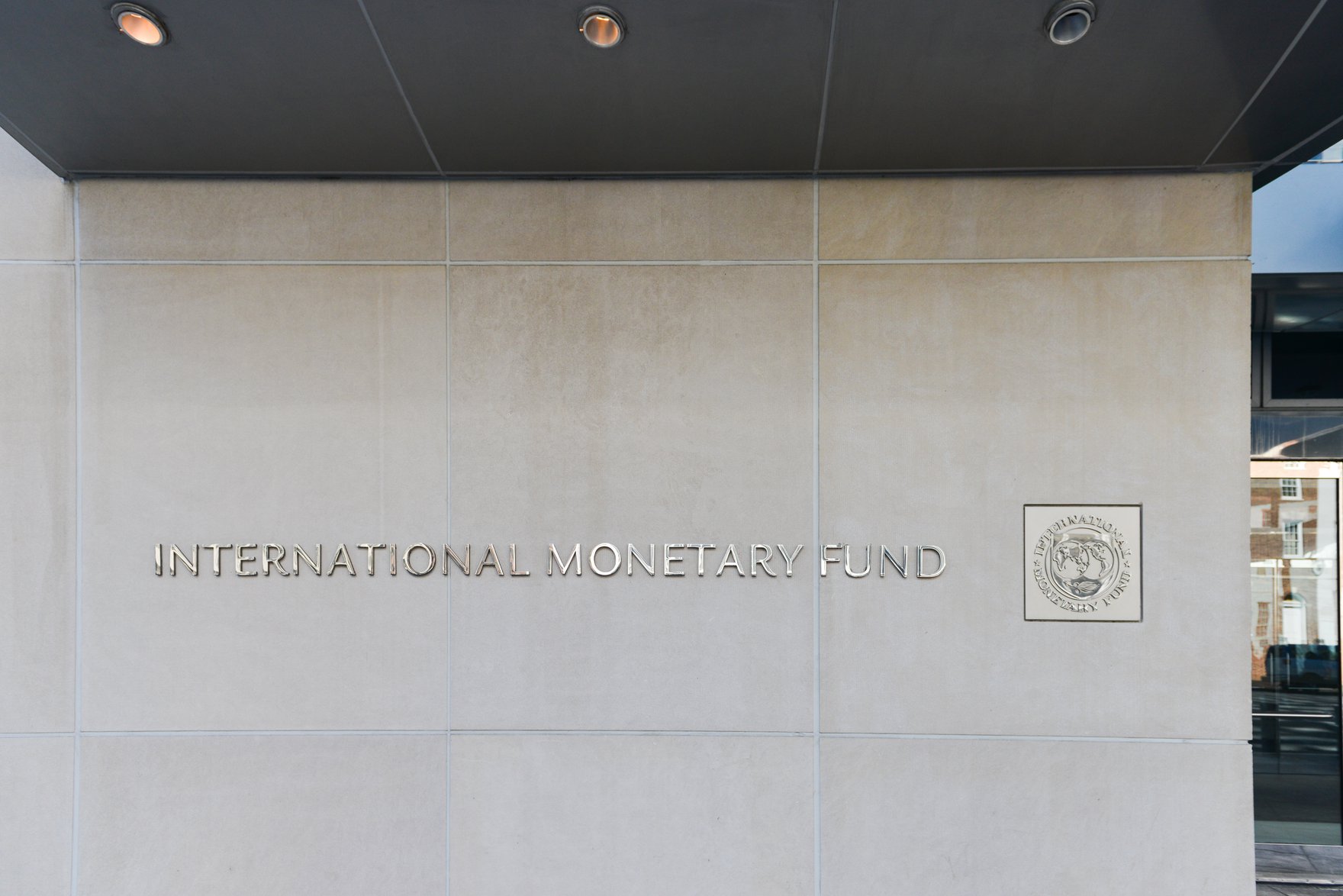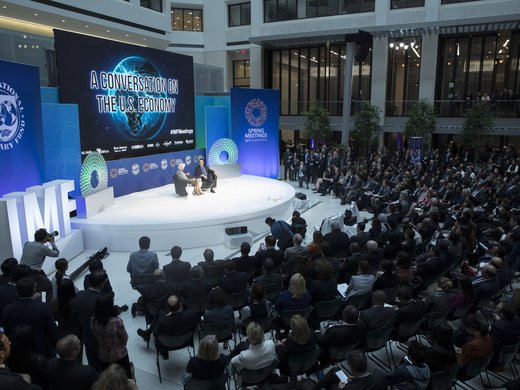The International Monetary Fund (IMF)/World Bank annual meetings this week are likely to be a low-key affair. After all, for the first time in a decade, pretty much the entire membership of the two international financial institutions is enjoying positive growth. Even Europe, which has been the source of concern at past gatherings of finance ministers and central bank governors, is growing at an encouraging pace. So, perhaps, delegates could be forgiven if the meetings take on a self-congratulatory atmosphere.
But there is a discomfiting fact lurking beneath the positive gloss likely to prevail in Washington: the economic recovery from the global financial crisis can only be described as anemic at best, and abysmal at worst. That dismal record helps explain the growing political polarization in most members of the North Atlantic economy — the advanced economies of North America, Europe and Japan. And for the IMF, as the international financial institution whose mandate is to promote and sustain global growth, the post-crisis economic performance of these economies raises existential questions.
Fund officials like to stress that the IMF is a purely technocratic institution, one that avoids the murky world of national or global politics. While that is generally the case, the truth is that the Fund was created with a clear political mission. The Bretton Woods system was not just about exchange rate management, which the IMF supported. Underlying the system was an implicit social contract on maintaining full employment. The IMF promotes the international monetary cooperation needed to achieve this target.
To be sure, political cleavages in the advanced economies reflect several factors. Blame for them does not reside entirely, or even primarily, with the IMF. Nevertheless, the slow recovery from the global financial crisis created an environment in which these factors flourished. Moreover, the potential danger that lies ahead is that political polarization will lead to a polarization of policies and a fragmentation of the global economy.
This effect is evident in misguided efforts to renegotiate trade deals to ensure they correct “unfair” trade balances. The true measure of a trade agreement’s effectiveness is the improvement in productivity and competitiveness it creates for its members, not the bilateral trade balances that result. Of course, reducing tariff and non-tariff barriers will entail dislocation as sectors that had benefited from protection shrink. That is a legitimate source of concern. But, with economies at full employment, workers displaced in one sector will be absorbed by expanding sectors that benefit from expanded markets that the trade agreement creates. That is the importance of the implicit social contract.
Unfortunately, that felicitous effect was either muted or missing in action entirely in the post-crisis period. As Chapter 2 of the IMF’s recently released World Economic Outlook (WEO) notes, unemployment rates remain elevated in about three-quarters of advanced economies relative to their 2007 levels a full decade later. It is not surprising, therefore, that populist politicians around the globe are channelling the angst and anger of individuals who have lost jobs only to be engulfed in a vicious vortex of diminishing expectations for them and their children. The result is policy proposals that promise to return things to the way they were by insulating economies from the perceived pernicious effects of international trade.
The appeal of such policies in periods of economic and social distress is wholly understandable. In fact, in the depths of the Great Depression, John Maynard Keynes, who together with Harry Dexter White built the IMF, famously advocated economic self-sufficiency. “Let all goods be homespun whenever it is reasonably and conveniently possible,” he argued in The Yale Review in 1933, “and above all, let finance be primarily national.” Notably, however, Keynes recognized the need for caution in cutting economic entanglements: “It should not be a matter of tearing up roots but of slowly training a plant to grow in a different direction.” And he warned against three “outstanding dangers” in the pursuit of economic nationalism — silliness, haste, and intolerance and the stifling of instructed criticism — a warning that today’s champions of economic nationalism might profitably heed.
Keynes eventually recanted his advocacy of economic nationalism as its full costs became clear. The problem, he realized, is that, rather than a purely technocratic exercise, economic policy making is inherently political; economic nationalism leads to a zero-sum game perspective in which one can only gain at another’s expense. Moreover, as the tragic events of the 1930s illustrated, this perspective spilled over to other domains, in particular, foreign policy and national security.
It was precisely for this reason that Keynes and White designed the Bretton Woods system to transform the way people view the global economy: from a zero-sum game to a positive-sum game in which all “players” can benefit, provided they adhere to the rules of the game. They succeeded. Worryingly, their achievement is now at risk.
Finance ministers and central bankers converging on Washington this week to celebrate the return of truly global growth should therefore temper their celebrations with some difficult questions. Two stand out.
First, what went wrong?
Ten years of potentially stronger economic growth is a big prize to leave unclaimed. Was it truly the case that poor economic growth was the painful but inevitable price to pay for the “excesses” that led to the financial crisis, as some contend, or was the problem self-inflicted as governments adopted inappropriate or unhelpful policies? The IMF staff is to be commended for tackling this question. The latest WEO also contains a careful assessment of the role of fiscal policy in the global economy; although Chapter 4 is carefully written to avoid controversy among the Fund’s largest members, it is difficult to escape the conclusion that fiscal policy errors in the post-crisis period created insufficient global aggregate demand, which contributed to weak growth and output gaps that remain open a decade after the crisis.
Second, if insufficient aggregate demand was the problem, why wasn’t the IMF more effective in correcting the policies of its largest members?
The IMF monitors its members’ policies to ensure that they are consistent with sustained growth and global financial stability. The objective behind this surveillance function is to avoid situations in which inappropriate policies create domestic instability, which could pose a spillover risk to other members. Surveillance has been a source of contention for years, with emerging market and developing countries arguing that there are two standards — one for members like them who can be expected to draw on IMF resources, and another for the large advanced economies.
Partly in response to these concerns, in the wake of the crisis the role of the IMF in surveillance was strengthened to allow it to engage with members whose policies create potential systemic risks, even if they those policies were consistent with the obligation to promote stability. There is no requirement for members to change policies associated with this Integrated Surveillance Decision, however. It may be time to revisit this issue.
At the same time, the finance ministers and central bank governors who comprise the IMF’s board of governors should be prepared to reflect on the nature of the obligations that members owe to each other. The ability of the fund to deliver on the social contract of full employment is, ultimately, a function of members’ commitment to it; the managing director’s power to influence and cajole is limited, regardless of how effective she may be.
In this respect, delegates to the annual meetings this week in Washington would do well to note that institutions that fail to meet the objectives they were created to achieve are eventually consigned to the trash heap of history. That, too, is a discomfiting fact that all members of the international community should heed.



